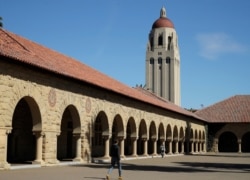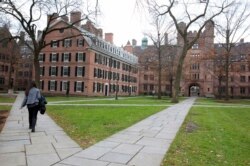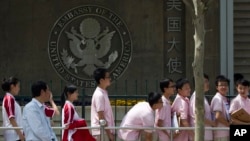Student Union
Screen College Students for COVID Every 2 Days, Researchers Advise
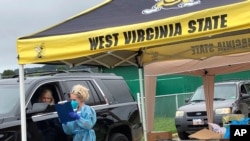
U.S.-based colleges and universities continue to struggle with how they will receive students while containing the spread of COVID-19.
Nearly 40% of schools say they will bring students back to campus, according to the Chronicle of Higher Education, which has compiled a database of college and university responses to COVID since the spring.
Even at schools where classes are 100% online, many students are living off-campus and taking online courses rather than remaining at home with their parents.
Researchers say schools would have to test their students every two days for COVID-19 to ensure their health and safety, and screening after symptoms emerge won’t control the spread, according to a study published July 31.
“We believe that there is a safe way for students to return to college in fall 2020,” the study authors wrote in JAMA Network, the publishing site of the Journal of the American Medical Association, on July 31.
“Screening every two days using a rapid, inexpensive, and even poorly sensitive test, coupled with strict interventions ... was estimated to yield a modest number of containable infections and to be cost-effective,” the authors wrote.
Another study by Cornell University in upstate New York suggested if students were tested every five days, that population would be safer in their campus bubble than the online student population, which would freely circulate where they reside.
But not every school is equipped to conduct COVID-19 testing at that pace because of staffing and cost.
At Mercer University in Macon, Georgia, the school community “must unilaterally share the responsibility of taking the necessary steps to minimize the risk of COVID-19 infections throughout our campuses.” Students will take a survey, and “may be required to be tested for the SARS-CoV-2 infection (COVID-19), depending on their survey responses. Regardless of survey results, any student may request and be tested for COVID-19.”
“Symptom-based screening alone was not sufficient to contain an outbreak,” the study authors wrote.
COVID-19 “can be transmitted by highly infectious but asymptomatic ‘silent spreaders,’” lead study author A. David Paltiel, Ph.D., of the Yale School of Public Health, described to VOA.
“It simply isn’t possible to move swiftly enough to contain an outbreak using nothing more than symptom-based monitoring. You can’t play catch-up with this virus,” Paltiel wrote.
“A school that tests and responds only when symptoms have been observed is like a fire department that responds only to calls when the house is already known to have burnt to the ground.”
At the State University of New York (SUNY) system, students are required to produce negative test results that were taken within 14 days before their arrival back to campus. The university asks them to quarantine between the test and receiving results, according to SUNY’s website.
“If you have symptoms consistent with COVID-19 or a temperature that is over 100 degrees Fahrenheit or 38 degrees Celsius, you will be directed to contact Student Health Services for an evaluation and a determination if you need to have a COVID-19 PCR test,” said the letter to students sent by Rick Gatteau, Stony Brook’s vice president for student affairs.
This, again, may be insufficient, the researchers said.
“Many schools are considering the option of carefully monitoring students for the symptoms of COVID-19 and using signs of illness to trigger isolation, contact tracing, and quarantine. We explored thousands of scenarios and failed to find even one plausible circumstance under which this strategy would be sufficient to contain an outbreak,” he wrote VOA.
“This sets a very high bar — logistically, financially, and behaviorally — that may be beyond the reach of many university administrators and the students in their care.”
At private universities like Stanford University in California, which has a $27.7 billion endowment, students will be tested for free.
“Each student will be tested twice: Once on approximately days 0-2 upon arrival, and then again on days 5-7 of their residence within Stanford housing. The tests will come at no cost to students,” according to the university’s COVID-19 FAQ’s page.
At Columbia University in New York City, all students, faculty and staff returning to campus will be required to take a COVID-19 test, they stated on their website.
“Students who test positive through the university testing program will be referred for contact tracing and will be required to isolate in designated on-campus rooms or in their off-campus residences until released by Yale Health,” Yale University stated on its webpage. “Medical monitoring and advice will be provided by Yale Health during isolation.”
Other educators say it is a struggle to manage social behaviors among young college students that might thwart their efforts.
University of Connecticut Professor Sherry Pagoto in the allied health sciences department, with graduate student Laurie Groshon, conducted student focus groups about returning to campus.
College students return to campus in a few weeks. We wanted to know their thoughts about quarantine, symptom tracking, contact tracing, and mask wearing on campus, so my grad student @laurie_groshon and I did focus groups to find out.
— Sherry Pagoto (@DrSherryPagoto) July 11, 2020
Here’s what students told us
1/x
“Every student we asked said that this is not realistic and will likely fail,” Pagoto tweeted.
“They pointed out that students are eager to see each other and will find a way to do so when they arrive on campus. They said that students who live one to two hours away will try to find a way to go home,” she tweeted. “They said off campus students will likely find their way on campus.”
Dr. Ravina Kullar, an infectious disease expert, backed up the students’ feedback.
“Preventing infection requires everyone to abide by strict infection control measures, including mask-wearing, hand hygiene, and social distancing on campus,” Kullar told VOA.
Colleges have a responsibility to supply students with adequate screening, masks and hand hygiene supplies, Kullar said, but success lies in the hands of the students and staff in abiding by strict COVID-guidance and not having mass social gatherings.
So many opportunities for exposure, and absolutely no routine testing. I'm worried.
— Dr. Theresa Chapple (@Theresa_Chapple) July 31, 2020
>
See all News Updates of the Day
- By VOA News
International students discuss US campus culture shock

International students at De Anza College in Cupertino, California, talked about culture shock in an article in La Voz News, the student newspaper.
"It felt like a major culture shock. Everything was so different, from academics to mannerism," said a student from Mexico.
Read the full story here.
These are the most expensive schools in the US
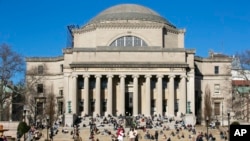
High tuition costs along with housing and food expenses can add up for students at U.S. colleges and universities.
MSNBC looked at the most expensive schools in the country, with one costing more than $500,000 for a bachelor’s degree. (June 2024)
Uzbekistan students admitted into top US universities
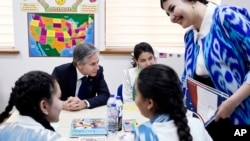
Students from Uzbekistan are among the international students admitted to top colleges and universities in recent years.
Gazata.uz profiled some of the Uzbekistan students attending Harvard, Brown, Princeton and other U.S. universities. (June 2024)
- By Stella Hsu
Reports of visa checks, deportations worry Chinese STEM students in US
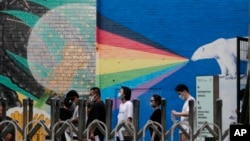
Geopolitical tensions and growing competition in tech between the United States and China appear to be spilling over into academia despite commitments from the world’s two biggest economies to boost people-to-people exchanges.
The United States remains the top choice for Chinese students seeking to study abroad with nearly 300,000 studying in American colleges and universities during the 2022-2023 school year. But reports of some cases that students and professors are facing extra scrutiny while passing through immigration and the deportation of others are raising concerns.
For Chen Xiaojin, a doctoral student studying semiconductor materials at a university in the Washington, D.C., metropolitan area, it has been six years since she returned to her hometown of Beijing.
At first, it was the COVID-19 pandemic that kept her from going home. But over the past two years, she has been deterred by accounts of Chinese students majoring in science and engineering being required to reapply for their visas upon returning to China.
She also says she is worried by reports over the past six months of Chinese students being deported, even at nearby Dulles Airport.
"My current research is relatively sensitive, and my boss [adviser] is getting funds from the U.S. Department of Defense, making it even more sensitive,” she told VOA. "I am afraid that I won't be able to return after I go back [to China]."
Chen says that if she did return to China, she would have to apply for a new visa.
In a report late last month, Bloomberg said it had found at least 20 Chinese students and scholars with valid visas who were deported at U.S. Customs since November and barred from reentry. The U.S. Customs and Border Protection Agency does not release relevant data.
Immigration attorney Dan Berger represented one Chinese student who was deported late last year. He tells VOA Mandarin that the student studied biological sciences at Yale University and was about to complete her doctorate.
She visited her family in China and got a new visa but was deported by customs at Dulles Airport and barred from reentering the country for five years. Berger said he did not see anything suspicious in the transcript of the conversation between the student and the customs officer.
"We have seen what seems like a pattern over the last six months of Chinese PhD students being turned around…. more than I've seen in quite a while," he said.
Matthew Brazil, a fellow at the Jamestown Foundation, said neither country seems willing to explain the situation. However, he believes that in most cases, the United States must have valid reasons for blocking visa holders from entering the country.
In some cases, the student’s background may not match what is written on the visa application. In other cases, customs agents may also find something that the State Department missed, and once they see it, they are responsible for taking action.
"I wish the Chinese side would be specific about their students who were refused entry,” he said. “The fact that both sides are mum on details and that the Chinese side is engaged with the usual angry rhetoric means that each has security concerns. And that says to me that there was good reason for the U.S. to stop these particular applicants."
Brazil also sees a connection between the entry denials and export control regulations issued by the United States in October 2022 that restrict China's ability to obtain advanced computing chips, develop and maintain supercomputers, and manufacture advanced semiconductors.
U.S. Customs and Border Protection is one of the law enforcement agencies authorized to investigate violations of export control regulations, he said.
"Beijing's intelligence agencies are known to focus attention on PRC [People's Republic of China] students and scientists headed abroad who study or work on dual-use technologies controlled under the Export Administration Act — compelling Chinese students and scientists to report on what they've learned when they return to China on holiday,” he said. “This has been true for decades."
Bill Drexel, a fellow for the Technology and National Security Program at the Center for a New American Security, said the U.S. government did find some cases where students tried to steal strategic technology for China.
"I think it would both not be surprising that they found some really questionable or incriminating evidence for some students,” he said. “It would also not be surprising if, in their hunt for really solid evidence, they also may have made some mistakes on other students.”
Drexel adds that “it’s just kind of an unfortunate fact of the time that we live in and the tactics that the CCP uses when it comes to these measures."
In a post on X in early May, U.S. ambassador to China Nicholas Burns tried to dispel concerns about visas and entry to the United States for students and scholars. In the post, he said "99.9% of Chinese students holding visas encounter no issues upon entering the United States.”
In an interview with The Wall Street Journal Monday, Burns said it is China that is making it impossible to promote people-to-people ties. Burns told the Journal that students attending events sponsored by the United States in China have been interrogated and intimidated.
He also said that since U.S. President Joe Biden and China’s leader Xi Jinping held their summit in San Francisco last year, China’s Ministry of State Security and other agencies had interfered with Chinese citizens’ participation at some 61 events.
At a regular briefing on Wednesday, Chinese Foreign Ministry spokesperson Mao Ning dismissed those accusations, saying that they did not “reflect reality" and that went against key understandings reached by both countries’ presidents in San Francisco.
“The United States, under the pretext of 'national security,' unjustifiably harasses, interrogates, and deports Chinese students in the U.S., causing them significant harm and creating a severe chilling effect,” Mao said. “The image of the United States in the minds of the Chinese people fundamentally depends on the actions of the United States itself.”
Drexel said he believes Burns’ comments about visas and students' willingness to study in the U.S. still ring true.
“On balance, it's still the case that American universities are overwhelmingly warm towards Chinese students and want them in large numbers," he said.
However, Berger, the immigration lawyer, is concerned about the chilling effect recent cases involving Chinese students could have.
"In general, we are being more careful about advising Chinese graduate students in STEM fields about traveling and letting them know that there is some small risk,” he said.
Even though the risk is small, it does seem to be real at the moment, he said.
Adrianna Zhang contributed to this report.
US federal judge blocks new regulation targeting for-profit colleges
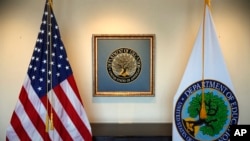
A federal judge in Texas has blocked a regulatory provision targeting for-profit colleges that was scheduled to take effect in July 2024.
Times Higher Education reports that the rule, which would affect student loans, was challenged by for-profit institutions. (June 2024)





